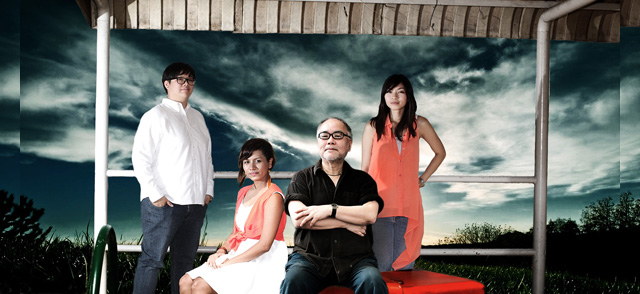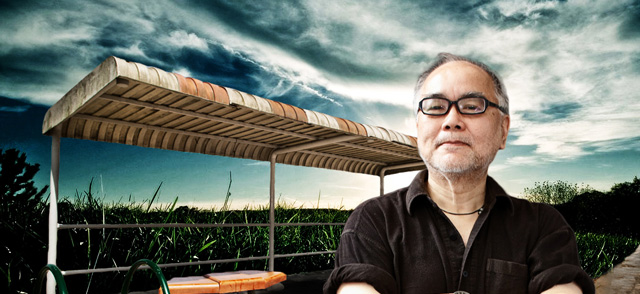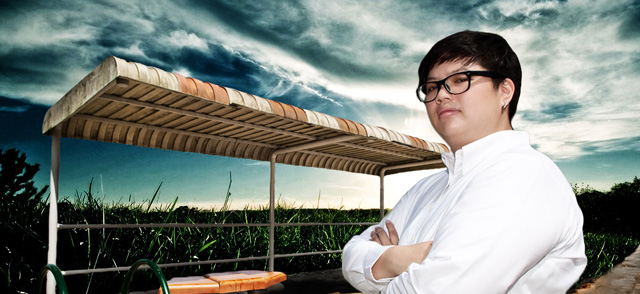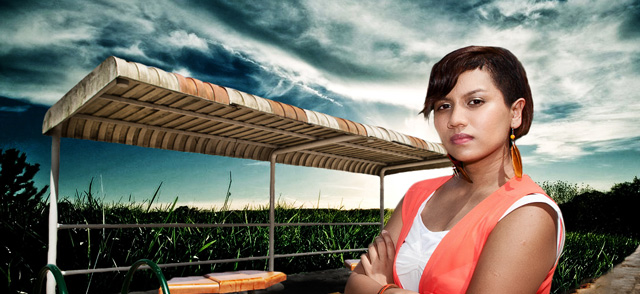




In-Between: Dialogue with Danny Yung
“It is perhaps a point of intersection in their lives,
or perhaps a stop in their lifelong journey.”
(Bus Stop, Gao Xingjian)
Characters




Time and Date
12:30PM on a Saturday afternoon
Venue
15 Minutes café
Written by Kate, Wang Fang
0: Between You and Me
Hong Kong director Danny Yung recently visited Singapore for the staging of 100 Years of Solitude: Cultural Revelution, the opening of his exhibition Play Things, and to organise a Youth Forum at the School of the Arts. During his time here, we invited him to engage in a dialogue with 3 young theatre practitioners in Singapore.

As Danny walked into the café, we greeted him with handshakes and self-introductions. As we were about to do more elaborate introductions of ourselves, he suggested that we introduce one another instead, "Why don't you introduce her and her, him?" So that was how it began.
Entia graduated from NTU Chinese Studies and is now working at the Singapore Tourism Board. Nabilah graduated from the one-year theatre training programme offered by Teater Ekamatra and now works at the Singapore Art Museum. Liting is amongst us the only one practising theatre full-time. Hence, the dialogue kicked off with the discussion about the tension of pursuing theatre and holding a day job.
1/3: Between the Devil and the Deep Blue Sea
Eng Hao: |
How does one juggle between having a day job and practising theatre? |
Danny: |
I often ask myself whether being an artist is a profession or a commitment. If it is a commitment then it doesn't make sense that you work from 8 to 5 - because you think about it all the time and you need to figure out your own schedule. |
Entia: |
Struggling with bread and butter is a very fundamental problem to me. How do I strike a balance between feeding my family and sitting there thinking about my life? It is very tiring mentally and physically to have job-work and creation-work going on at the same time. It is a very practical issue and I think we all feel like giving up at certain moments. Do you ever feel like giving up? What is the thing that holds you back? |
Danny: |
I thought being involved in creative work is lots of fun, and how can I give that up? Of course it would be nice if I can do it 24 hours a day but if I can't, I will do as much as I can. 12 hours, 8 hours, 4 hours, 1 hour, or 30 minutes a day, that's okay. There is no such thing as having more time means better work. I used to think that I will never want to be a professional artist because I don't like that as a profession. I think creative works shouldn't be labelled as a profession. If I can, I would turn my bread and butter job creative and fun. You ask yourself: if I were to perform to a deadline, how can I make it really interesting? It has to do with your boss, of course! He or she will come in and say that you have to do things in a certain way, but that is a matter of how you communicate with him or her, right? I used to think I would never want to make a living by being an artist, because I think it is more than money. But because of the whole economic system now everything is labelled with a price tag. People come and say that they want to buy your work but you can say "Oh! It's priceless! But I can give it to you for free." Everything can be creative and fun if you have this mocking attitude. You know, the menu can be very interesting. And I used to think all these things are very mundane and it's kind of boring to do their job. But if they change their menu every day and do funny things with it – of course it costs more – perhaps the waiter and waitresses would be much happier, or the kitchen! But now they just function, as it is. |

2/3: Between A Rock and A Hard Place
Danny: |
So why do you want to do theatre, instead of becoming a cook, or something else which can be just as fun? |
Nabilah: |
I think on the theatre stage, you get to really push boundaries. Whatever issue you are trying to explore, you can take it to the extreme within the limits of, say, MDA's license. And it is a safe space; the audience take what they want from what you present. |
Danny: |
So your interest is basically on limitations, boundaries, right? So in day to day life, you cannot deal with boundaries, like political boundaries or social taboos, but in theatre you can do that. |
Nabilah: |
Yes. In real life you are scared of offending people. |
Danny: |
So you think you can offend people in theatre? |
Nabilah: |
Some people? (Laughs) |
Danny: |
How about you (Liting)? |
Liting: |
I spent a lot of time pondering upon this question. I have been doing freelance theatre for about a year and a half – almost for 2 years now, and it is a question I constantly ask myself. Why am I doing theatre? Then I realised that it is the only thing that makes sense to me – for me to understand what's happening in the world. |
Danny: |
So it is learning; a classroom after school? - Because our school system is not providing a learning environment. |
Liting: |
Exactly. I went to school for theatre but I did not learn anything that is really useful compared to what I've learnt working in the past 2 years. |
Entia: |
For me, it's a very simple reason – because it's very fun. I'm not sure about this but I think everyone starts with a very simple reason. I doubt anyone starts doing theatre by thinking that they want to change the world. You start with a simple reason and as you do, you realise that there's more you can do with theatre and you become a little bit more ambitious. Before theatre we looked at our lives in a very standard way, a way in which we've been educated. But when we do theatre, we are opened up to looking at life in many perspectives. This is why I feel theatre has enriched my life. |
Danny: |
So in day to day life, we don't get to see or learn or sense a lot of things. But I was thinking: why is our social environment so limiting, that going to theatre is almost like an escapist approach? Why does our school system have so many problems? Can we change the school system? Can theatre be education theatre? In a way, we need therapy - not in the sense that we are sick, but we need a different way of sorting out our emotional and intellectual needs. It's easy to fall into the trap of seeking purely emotional or psychological needs, that's almost like saying "I'm sick, I'm not well" instead of saying "No. I'm ok. The system is sick and not well." |

3/3: Between Them and Us
Nabilah: |
Regarding theatre and escapism... |
Danny: |
Well I'm just using a provocative word. You only escape when people chase you, but so far it is only a very subtle force that is pushing you to the corner. When 90% of the population is opposing you, do you let them corner you, or do you think: why are these people behaving this way? Can we analyse these people? Perhaps within the 90%, 20% of them have the potential of having dialogues with us. So when we do theatre sometimes we are dialoguing with those 20%. Then you go on to think: how do I create a common platform for the dialogue? Are we trying to convert them? Judge them? Or do we really want to have an open dialogue? |
Eng Hao: |
Speaking of open dialogue, theatre practitioners are always trying to find ways to do that because it is very easy for theatre to convey one-sided messages. Are there other ways of dialoguing besides just inviting the audience to come and watch a show? |
Danny: |
Yes, we know that theatre is just another institutionalised form. Why should theatre start at 7:15PM and end at 9:00PM? Why do we have to buy tickets to gain entry into the theatre? Why do we have to sit on one side in the theatre like a classroom setting? Can you raise your hand as in the classroom situation then? Should we have interactive dialogues? Why is the capacity of the theatre 180 to 1200 people? What is the factor of its size? Who designs the theatre? Why is there black box theatre? How does it relate to a political assembly or a night club? We try to understand the current status of the theatre by raising question about its institution, architecture, organisation structure, and operation. The good thing about the black box theatre is that it seems like you can do experimentation. But you are also constrained by your own habits. What is experimentation? I remember when I was in high school, when asked to do experiments, everything was spelt out step by step for me. So what is experimentation? What is risk-taking when you experiment? |
Entia: |
This is one of my questions as well: there are people who will do experimental works which other people don't understand. What is the basis of experiment to you? |
Danny: |
I will do what Nabilah did. I will ask: what are the boundaries? If I touch on the boundaries I'm experimenting on the boundaries. What are the boundaries of the physical space, social space or political space? I might be talking about the boundaries of the self too. First step is to acknowledge our boundaries. The second step is to do what Liting have said - learn about ourselves, our systems. Then perhaps we can cope with the system better, or perhaps we can change the system eventually. |
Eng Hao: |
As the artists push for boundaries, the officials would always say that artists should be socially responsible too. How do we strike a balance between those two? |
Liting: |
I think it is the responsibility of an artist to push the boundaries, rather than pushing the boundaries within a ‘responsible framework'. |
Danny: |
The hypothesis of this statement is that the artists are not responsible! I think there's something wrong with this. The assumption is that artists are rebellious and loose – you have to challenge that, not by saying that "I am responsible!" but by asking them "are you responsible to the current system?" then you turn it to a reversal of discourse with people who make such a statement, because this is very suppressive! We should deal with people who label artists. There is a lot of stereotyping of artists, saying that you are just a group of social outcasts. They give us a black box - a ghetto, and we just stay inside that ghetto. |
Liting: |
Yes I do feel that the policies here suppress the kind of art that is being made. We are given this grey area. It is very insidious to me because it is not defined. The moment you step into the area you trigger the alarm and you might not be able to do your show. I had the experience of doing a show that dealt with the death penalty. We went back and forth with the Arts Council only to get a reply from them 2 weeks before the opening date, stating that they will not be funding the show. The theatre company is very reliant on the funding so when we received the news we didn't know whether we should go on or just cancel the show. In the end everyone paid money out of their own pockets so that the show could go on. It was never ever explained to us why we didn't get the funding. The MDA actually gave us the performance license but not the Arts Council. I am very aware of these things and I don't know if I would really want to push those boundaries as they can have real implications on me - where you just can't go on because you have no money. |
Danny: |
If you are concerned about the death penalty, would it be easier if you just talk about it instead of doing a performance? If you talk about it, who are you addressing to and how do you turn your creativity into making sure the issue can be brought out to the right kind of audience? It sounds like you are very much dependent on the kind of platform provided for you to express or articulate your concern. But platforms can vary. You can write, talk, go on to the radio, maybe street theatre – that's what Drama Box has been doing! And it can be very good case studies for you to learn about their community strategies. Think about even more creative ways, it can be very interesting. I think theatre is never confined to a theatre space, because the theatre institutions have so many constraints, just as many constraints as any other thing - in the name of art. So coming back to what I said earlier: it is very easy to get ourselves categorised. How do you deal with the institutionalisation of what you believe in? How can you build a new kind of institution that critiques the existing ones? I think Drama Box would be very interested in seeing other kinds of Drama Boxes. Drama Carriages? Maybe Drama Trunks? Or even go beyond it! |

∞: Between You and Me
As we ended the dialogue, we find ourselves asking more questions rather than seeking more answers. What is the definition of an artist? What is Theatre? What are the limitations of ourselves and our society? How do we understand and change for the better? We carried the questions with us, and went on our ways to make life as fun as it could be.
Photography by: Pantheon
Special thanks: 15 minutes café
Danny Yung
Danny Yung is an experimental art pioneer, the founder cum Co-Artistic Director of Zuni Icosahedron and Chairperson of the Hong Kong Institute of Contemporary Culture. In the past 30 years he has been deeply involved in multifarious fields of the arts, mainly in theatre, cartoon, film and video, visual art and installation and is widely regarded as one of the most influential artists in Hong Kong and its neighbouring regions. He advocates experimental arts and new art forms, and he has been involved in over 100 theatrical productions as director, scriptwriter, producer and stage designer through the years. He champions dialectical thinking and has contributed significantly to the provision of a platform for both acclaimed and budding artists to explore and practise theatre art in Hong Kong, as well as across Europe, Asia and the United States and more than 30 cities.
Win a pair of tickets to Bus Stop!
Have you ever been to a performance where your otherwise perfect experience was disrupted due to poor theatre etiquette from another audience member? Share with us your most unforgettable encounter as a victim of such disturbances!
- All entries should reach us by 9 March 2012.
- In case of dispute regarding contest
winner and prize, the decision of
Drama Box shall be final.

